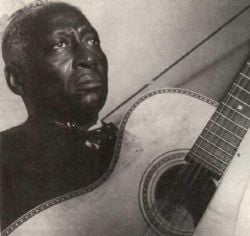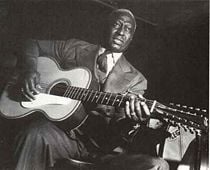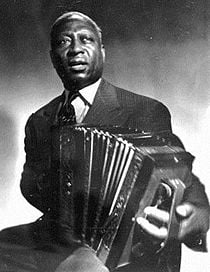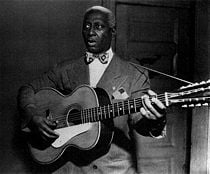Lead Belly
| Huddie William "Lead Belly" Ledbetter | |
|---|---|
 | |
| Born | January 23,1888 Mooringsport, Louisiana, U.S.A. |
| Died | December 6, 1949 New York City, New York, U.S.A. |
| Genre(s) | Blues, Folk |
| Years active | 1936 - 1949 |
| Official site | http://www.leadbelly.org/ |
Huddie William Ledbetter (January 23, 1888 - December 6, 1949), better known as Leadbelly, was an American folk and blues musician, notable for his clear and forceful singing, his powerful use of the 12-string guiatar, and the rich songbook of folk standards he introduced.
In addition to the 12-string and six-string guitar, he could also play the piano, mandolin, harmonica, violin, concertina, and accordion. One of the first well known U.S. singers of topical songs Leadbetter became particularly popular among trade unionists and the left-wing folk music culture of fellow musicians and friends such as Pete Seeger, Woodie Guthrie, and others.
The topics of Leadbelly's music covered a wide range of subjects, including gospel, blues, songs, about women, liquor, racism, cowboys, prison, work, sailors, cattle herding, dancing, and the newsmakers of the day, such as President Franklin Roosevelt, Adolf Hitler, the Scottsboro Boys, and multi-millionaire Howard Hughes.
Biography
Early Life
Once a matter of debate, Huddie Ledbetter's birthday is now generally thought to be January 23, based mainly on his World War II Draft registration of 1942, he, himself, helped fill out. The year of his birth is more contentions. He gave his birthdate as 1889 on that occasion, but other genealogical evidence suggests he was born January 23, 1888.
In any case, Lead Belly was born to Wesley and Sallie Ledbetter as Huddie William Ledbetter on a plantation near Mooringsport, Louisiana. The family moved to Leigh, Texas, when he was five. It was here that he received his first instrument, an accordion, from his uncle. By 1903, Lead Belly was already a "musicaner," a singer and guitarist of some note. He performed for nearby Shreveport, Louisiana audiences in St. Paul's Bottom, a notorious redlight district in the city. He began to develop his own style of music after exposure to a variety of musical influences on Shreveport's Fannin Street, a row of saloons, brothels, and dance halls in the Bottom.
At the time of the 1910 census, he still officially listed as "Hudy," and was living next door to his parents with his first wife, Aletha "Lethe" Henderson, who was then 17 years old, and would have been 15 at the time of their marriage in 1908. By his early 20s, after fathering at least two children, he left home to find his living as a guitarist (and occasionally, as a laborer). On the road, he was anything but faithful to his wife and would later brag that as a youth he would "make it" with 8 to 10 women a night.
Prison years
Lead Belly's boastful spirit and penchant for the occasional skirmish sometimes led him into trouble with the law, and in January 1918 he was imprisoned in Dallas, Texas for the second time, after killing one of his relatives, Will Stafford, in a fight. In prison, he enterained guards and fellow prisoners with his playing and singing and thus won high marks for good behavior. He was released seven years into his 20-year sentence, reportedly after writing a song appealing to Governor Pat Morris Neff for his freedom and by appealing to Neff's strong religious values.
- Please, Governor Neff, Be good 'n' kind
- Have mercy on my great long time...
- I don't see to save my soul
- If I don't get a pardon, try me on a parole...
- If I had you, Governor Neff, like you got me
- I'd wake up in the mornin' and I'd set you free
In 1930, Lead Belly was back in prison, this time in Louisiana for attempted homicide. It was in the Louisiana State Penitentiary, in July 1933, that Huddie first encountered folklorist John Lomax and his son Alan, who were collected recordings for the Library of Congres. The two were enchanted by his talent, passion, and singularity as a performer. They recorded hundreds of his songs on portable recording equipment. The following year Lead Belly was once again pardoned, this time after a petition for his early release was taken to Louisiana Governor O.K. Allen by the Lomaxes.
Ledbetter acquired his famous nickname while he was imprisoned in Louisiana. His fellow inmates dubbed him "Lead Belly" as a play on his last name and a testament to his physical toughness. For instance, when one of the inmates tried to stab him in the neck (which left him with a scar) during his second prison term, he took the knife away and almost killed his attacker with it in turn. By the time he met the Lomaxes, he was using the nickname as a pseudonym, and the name stuck ever since.
Life after prison
Indebted to the Lomaxes, Lead Belly allowed Alan Lomax to take him under his wing. In late 1934 he migrated to New York City with Lomax, where he attained fame, though not fortune. In 1935 he married Martha Promise and began recording with the American Record Corporation (ARC). However, ARC insisted he record blues songs rather than the folk music with which he was more proficient. He achieved little commercial success with these records and struggled financially. His inclination toward violence had mellowed somewhat, but his reportedly threatening Lomax with a knife put and end to their friendship. By 1939 he was back in jail for assault.
Upon his release in 1940, however, Lead Belly returned to a surging New York folk scene, and befriended such early folk stars as Woody Guthrie and the young Pete Seeger. Their association would provide the former convict with an willing audience for his style of singing and playing, and he became a popular performer with New York and national left-wing and trade union folk audiences. During the first half of the decade, he recorded for RCA, the Library of Congress, and for Moe Asch, the future founder of Folkways Records).
Lead Belly was unique among black recording artists of his day. His driving vocal style and equally powerful strumming of his 12-string guitar were his trademarks, along with his one-of-a-kind rendition of folk songs such as "Midnight Special," "John Henry," "Alabama Bound," "The Boll Weevil Song," "Careless Love," "John Hardy," and his signature song, "Goodnight Irene," considered by many to be his own composition but in reality a case of the folk process resulting in a "original" version of an older song.
Influenced by his association with Seeger, Guthrie, and others, Lead Belly also recorded a large number of topical songs, including "Bourgeois Blues," "Jim Crow Blues," "Scottsboro Boys," and "Hitler Song." He often performed with them at hootenannies and union halls, in support of left-wing causes. Throughout his career he failed to gain a serious audience among either urban or rural black, but remained popular in folk circles.
In 1944, he headed to California, where he recorded strong sessions for Capitol Records. In 1949 he began his first European tour, but fell ill before its completion, and was diagnosed with amyotrophic lateral sclerosis, or Lou Gehrig's disease. Lead Belly died later that year in New York City, and was buried in the Shiloh Baptist Church cemetery in Mooringsport, 8 miles west of Blanchard, Louisiana, in Caddo Parish.
Musical legacy
Lead Belly's vast songbook, much of which he adapted from previous sources, has provided material for numerous folk, country, pop and rock acts since his time, including:
- ABBA, who recorded both "Pick A Bale Of Cotton" and "Midnight Special"
- Pete Seeger's band The Weavers (who had a hit with "Goodnight Irene" the year after Lead Belly's death)
- The Animals (who had a hit with "The House of the Rising Sun" in 1964)
- Creedence Clearwater Revival (who recorded a popular version of "Midnight Special" and "Cotton Fields" in 1969)
- Nirvana (who covered "Where Did You Sleep Last Night" in 1993 on their MTV Unplugged performance). Kurt Cobain prefaces the song by referring to Lead Belly as "my favorite performer... our favorite performer." Nirvana's 2004 box set With the Lights Out contains four Lead Belly covers: "Where Did You Sleep Last Night"; "They Hung Him On A Cross," "Ain't It A Shame" and "Grey Goose."
- Mark Lanegan also covered "Where Did You Sleep Last Night" for his album The Winding Sheet (1990), with Kurt Cobain participating
- Davy Graham covered "Leavin' Blues"
- The Rolling Stones adapted "The Bourgeois Blues" for "When The Whip Comes Down."
- Van Morrison's first performance as a child was "Good Night, Irene," and he later recorded the song with Lonnie Donegan. In the title track to Astral Weeks, Morrison alludes to meeting Huddie Ledbetter in heaven.
- Bryan Ferry also covered "Good Night, Irene" for his album, "Frantic"
- Lead Belly has also been covered by Ry Cooder, Lonnie Donegan, Grateful Dead, Johnny Cash, Gene Autry, The Beach Boys, Led Zeppelin, Billy Childish (who named his son Huddie), Mungo Jerry, Paul King, Michelle Shocked, Tom Waits, British Sea Power, Rod Stewart, Ernest Tubb, Nick Cave and the Bad Seeds, Nirvana, The White Stripes, The Fall, Smog, and Raffi, among many others.
- Lead Belly has been mentioned in songs by Pete Seeger, Bob Dylan, Van Morrison, Pearl Jam, Old Crow Medicine Show, The Dead Milkmen, Bubbi Morthens (an Icelandic musician), Dulaney Banks and Stone Temple Pilots
- Nigel Blackwell impersonates Lead Belly in the Half Man Half Biscuit song "24 Hour Garage People"
- Led Zeppelin adapted 'Gallis Pole' into 'Gallows Pole' on their third album
- Weddings Parties Anything have recorded 'Bourgouis Blues'
- Rory Gallagher covered 'Western Plain', his version going by the title 'Out On The Western Plain'
- The Los Angeles based punk rock group X recorded Lead Belly's "Dancin' With Tears In My Eyes" as a tribute to singer Exene Cervenka's sister Mary, who had been killed in a car crash earlier. The song appears on their 1982 album Under The Big Black Sun, most of the material of which was about Mary Cervenka's tragic, untimely death.
"Lead Belly" versus "Leadbelly"
Though many releases list him as "Leadbelly," the correct spelling is actually "Lead Belly." This is the way he wrote his nickname, and it is also the way that his nickname is listed on his tombstone [1][2], as well as the Lead Belly Foundation and various LP/CD releases (most notably his recordings for Folkways, for example Lead Belly's Last Sessions and Where Did You Sleep Last Night).
Songs
See: List of Lead Belly songs.
Selected discography
The Library of Congress recordings
Lead Belly's complete Library of Congress recordings, done by John and Alan Lomax from 1934 to 1943, were released in a six volume series by Rounder Records in the early-to-mid 1990s:
- Midnight Special (1991, Rounder Records)
- Gwine Dig a Hole to Put the Devil In (1991, Rounder Records)
- Let It Shine on Me (1991, Rounder Records)
- The Titanic (1994, Rounder Records)
- Nobody Knows the Trouble I've Seen (1994, Rounder Records)
- Go Down Old Hannah (1995, Rounder Records)
Other compilations
- Huddie Ledbetter's Best (1989, BGO Records) - contains Lead Belly's recordings made for Capitol Records in 1944 in California.
- King of the 12-String Guitar (1991, Sony/ Legacy Records) - a collection of blues songs and prison ballads recorded in 1935 in New York City for the American Record Company, including previously unreleased alternate takes.
- Lead Belly's Last Sessions (1994, Smithsonian Folkways) - a four disc box set containing Lead Belly's final sessions, recorded in late 1948 in New York City. These were his only commercial recordings done on magnetic tape.
- Lead Belly Sings for Children (1999, Smithsonian Folkways) - includes the 1960 Folkways album Negro Folk Songs for Young People in its entirety, and five of the six tracks from the 1941 album Play Parties in Song and Dance as Sung by Lead Belly, recorded for Moe Asch, as well as other songs recorded for Asch from 1941 to 1948, and one previously unreleased track, a radio broadcast of "Take this Hammer."
- Private Party November 21, 1948 (2000, Document Records) - contains Lead Belly's intimate performance at a private party in late 1948 in Minneapolis.
- Take This Hammer (2003, Smithsonian Folkways) - collects all 26 songs Lead Belly recorded for RCA in 1940, half of which feature the Golden Gate Jubilee Quartet.
Samples
- Download a sample of "Where Did You Sleep Last Night" from Wikimedia Commons
- Color footage of LeadBelly singing "Pick a bale of Cotton": [3]
ReferencesISBN links support NWE through referral fees
- White, Gary; Stuart, David; Aviva, Elyn. "Music in Our World." 2001. ISBN 0-07-027212-3. (p. 196)
External links
- "Where Did You Sleep Last Night" MP3 file on The Internet Archive
- "Ledbetter, Huddie (Leadbelly)" in the Handbook of Texas Online
- The Leadbelly Web
- The Lead Belly Foundation
- Leadbelly (1976) at the Internet Movie Database
- All Music Guide
- Video of Lead Belly singing Take This Hammer
Template:Blues
Credits
New World Encyclopedia writers and editors rewrote and completed the Wikipedia article in accordance with New World Encyclopedia standards. This article abides by terms of the Creative Commons CC-by-sa 3.0 License (CC-by-sa), which may be used and disseminated with proper attribution. Credit is due under the terms of this license that can reference both the New World Encyclopedia contributors and the selfless volunteer contributors of the Wikimedia Foundation. To cite this article click here for a list of acceptable citing formats.The history of earlier contributions by wikipedians is accessible to researchers here:
The history of this article since it was imported to New World Encyclopedia:
Note: Some restrictions may apply to use of individual images which are separately licensed.



